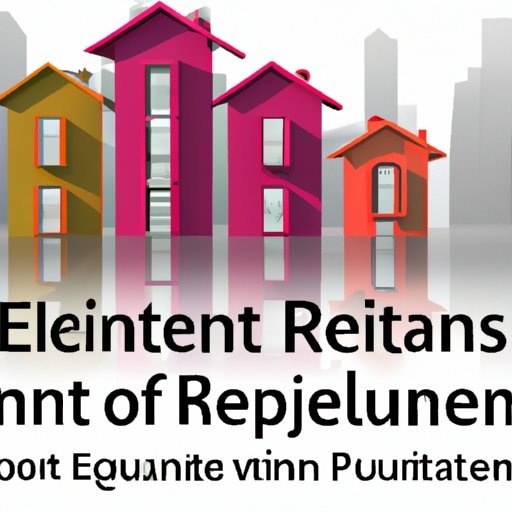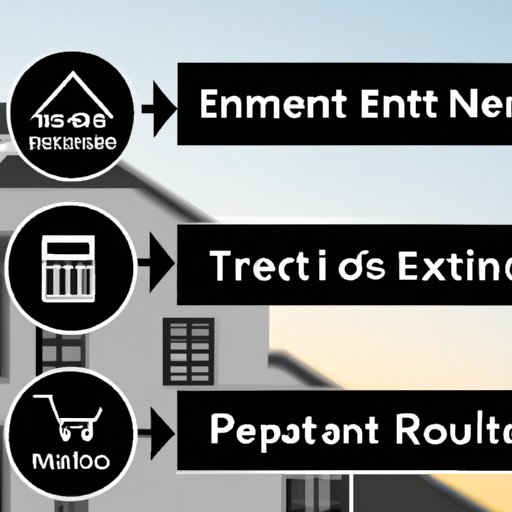Introduction
A rental property is a real estate investment where a landlord collects rent from tenants in exchange for the use of a residential or commercial property. Investing in a rental property can be a great way to generate income and build wealth over time. However, it’s important to understand the potential risks and rewards associated with owning a rental property before making such an investment. In this article, we’ll explore the pros and cons of investing in a rental property, as well as the financial benefits, different types of rental properties available, tax implications and steps necessary to purchase a rental property.
Analyzing the Pros and Cons of Investing in a Rental Property
When considering whether to invest in a rental property, it’s important to weigh the advantages and disadvantages of such an investment. Let’s take a look at some of the pros and cons of owning a rental property.
Advantages of Owning a Rental Property
The most obvious advantage of owning a rental property is the potential for generating income. As the owner of a rental property, you’ll receive monthly rent payments from your tenants that can help supplement your other income sources. Additionally, rental properties typically appreciate in value over time, so you may be able to sell the property at a profit after several years of ownership. Furthermore, rental properties often provide tax advantages, allowing you to deduct certain expenses related to the property on your taxes.
Disadvantages of Owning a Rental Property
Despite the potential benefits of owning a rental property, there are also some drawbacks. For starters, rental properties require a significant amount of money up front in order to purchase the property and make any necessary repairs or renovations. Additionally, rental property owners are responsible for all maintenance and upkeep of the property, which can be a time-consuming and costly endeavor. Finally, rental property owners must also deal with the challenge of finding and keeping reliable tenants.

Exploring the Financial Benefits of Owning a Rental Property
Before investing in a rental property, it’s important to understand the potential financial benefits of such an investment. Let’s take a look at how much income you can expect to earn from a rental property and what costs you should factor into your decision.
Potential Income from Rental Properties
The amount of income you can expect to earn from a rental property will depend on a number of factors, including the location of the property, the size of the property, and the condition of the property. Generally speaking, rental properties located in desirable areas with large floor plans and modern amenities tend to command higher rents than smaller or older properties. Additionally, rental property owners may be able to increase their income by charging late fees or requiring tenants to pay for utilities.
Cost Considerations for Rental Property Owners
In addition to the cost of purchasing the property, there are several other costs to consider when investing in a rental property. These include ongoing maintenance costs, insurance premiums, property taxes, and the cost of hiring a property manager if needed. Additionally, rental property owners should factor in the cost of vacancy, which is the amount of time that a rental property goes without being rented out.
Researching the Different Types of Rental Properties Available
When researching rental properties, it’s important to understand the different types of rental properties available. Generally speaking, rental properties can be divided into two categories: residential and commercial.
Residential Rental Properties
Residential rental properties are typically single-family homes, townhomes, or apartments that are rented out to individuals or families. Residential rental properties are generally less expensive to purchase than commercial properties and often require less maintenance. However, residential rental properties typically have lower rental rates than commercial properties.
Commercial Rental Properties
Commercial rental properties are typically larger buildings that are rented out to businesses. Commercial rental properties are generally more expensive to purchase than residential properties and usually require more maintenance. However, commercial rental properties often have higher rental rates than residential properties.

Examining the Tax Implications of Investing in a Rental Property
When investing in a rental property, it’s important to understand the potential tax implications of such an investment. Let’s take a look at the tax benefits and penalties associated with owning a rental property.
Tax Benefits of Rental Property Ownership
Owning a rental property can offer several tax advantages. For starters, rental property owners can deduct certain expenses associated with the property on their taxes, such as mortgage interest, property taxes, and insurance premiums. Additionally, rental property owners can depreciate the value of the property over time, which can result in significant tax savings.
Tax Penalties of Rental Property Ownership
It’s important to note that there are also some potential tax penalties associated with owning a rental property. For example, rental property owners are subject to capital gains taxes when they sell the property at a profit. Additionally, rental property owners may be subject to self-employment taxes if they hire a property manager or other contractors to manage the property.

Outlining the Steps Necessary to Purchase a Rental Property
Once you’ve determined that investing in a rental property is right for you, it’s time to start the process of actually purchasing a property. Here are the steps you’ll need to take in order to successfully purchase a rental property.
Financing Options for Rental Property Buyers
There are several financing options available to those looking to purchase a rental property. These include traditional mortgages, private loans, and investor financing. It’s important to shop around and compare different financing options in order to find the best rate for your situation.
Evaluation of Potential Rental Properties
Once you’ve secured financing for your rental property, it’s time to start evaluating potential properties. Be sure to thoroughly inspect each property before making a decision and consider factors such as location, size, condition, and potential rental income.
Closing on the Property
Once you’ve found a property you’d like to purchase, it’s time to close on the property. This involves signing all the necessary paperwork and transferring the funds to complete the purchase. It’s important to work with an experienced real estate attorney to ensure the closing process goes smoothly.
Conclusion
Investing in a rental property can be a great way to generate income and build wealth over time. However, it’s important to understand the potential risks and rewards associated with such an investment before taking the plunge. When investing in a rental property, be sure to carefully consider the pros and cons, financial benefits, types of rental properties available, tax implications, and steps necessary to purchase a rental property. With the right research and preparation, investing in a rental property can be a lucrative venture.
(Note: Is this article not meeting your expectations? Do you have knowledge or insights to share? Unlock new opportunities and expand your reach by joining our authors team. Click Registration to join us and share your expertise with our readers.)
